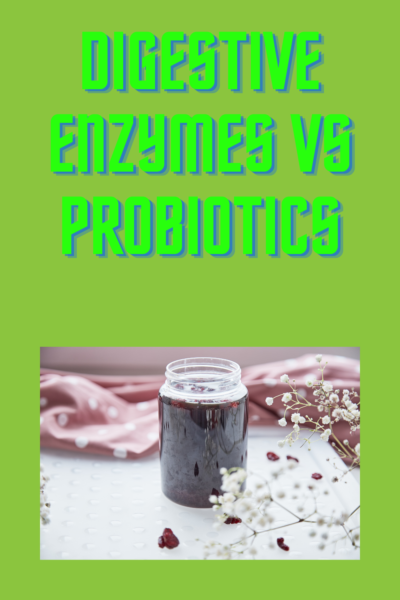Introduction
The world of digestive health and by extension gut health is complex and it can be hard to know what to do when you are struggling with your gut health. There are two prominent supplements often being the most commonly studied and taken-digestive enzymes and probiotics. These two factors play vital roles in maintaining a healthy gut, but they function differently and offer distinct benefits. In this blog post, I’ll delve into the differences between digestive enzymes and probiotics, exploring their roles, benefits, and when you might consider using one over the other.
Digestive Enzymes: Unveiling the Catalysts
Digestive enzymes are like the unsung heroes of our digestive system. These specialized proteins help break down complex food molecules into simpler forms that our bodies can absorb and utilize. Enzymes are produced naturally in the body, primarily by the salivary glands, stomach, pancreas, and small intestine. Each enzyme has a specific job, such as breaking down carbohydrates, proteins, and fats.
Benefits of Digestive Enzymes:
- Enhanced Nutrient Absorption: Digestive enzymes play a crucial role in breaking down nutrients into smaller molecules that can be absorbed through the intestinal lining, ensuring optimal nutrient uptake.
- Reduced Digestive Discomfort: For individuals with conditions like lactose intolerance or gluten sensitivity, supplementing with specific enzymes can alleviate digestive discomfort by aiding the breakdown of complex molecules that might otherwise cause issues.
- Eased Digestive Load: By assisting the body in breaking down food more efficiently, digestive enzymes can reduce the strain on the digestive system, potentially leading to increased energy levels and overall well-being.
Probiotics: The Gut’s Microbial Guardians
Probiotics, on the other hand, are live microorganisms, mainly bacteria and some yeast, that confer health benefits when consumed in adequate amounts. Our gut is home to trillions of microorganisms, collectively known as the gut microbiota. Maintaining a balance of beneficial bacteria is crucial for digestive health and overall well-being.
Benefits of Probiotics:
- Improved Gut Health: Probiotics help maintain a balanced gut microbiota, supporting digestion, immune function, and even mental health. They compete with harmful microorganisms, preventing them from gaining a foothold and causing problems.
- Enhanced Immunity: A significant portion of the immune system resides in the gut. Probiotics stimulate the production of immune cells and regulate immune responses, contributing to a stronger immune system.
- Digestive Harmony: Probiotics can aid in alleviating various digestive issues, such as irritable bowel syndrome (IBS), constipation, and diarrhea, by promoting a balanced gut environment.
Digestive Enzymes vs. Probiotics: Choosing the Right Solution
The choice between digestive enzymes and probiotics depends on your specific needs and circumstances.
- When to Choose Digestive Enzymes:
- If you experience bloating, gas, or discomfort after eating certain foods, digestive enzymes can help break down those foods more efficiently.
- If you have conditions like exocrine pancreatic insufficiency (EPI) or celiac disease, where the body’s natural enzyme production is insufficient, enzyme supplements might be beneficial.
- When temporarily transitioning to a diet that your body is unaccustomed to, digestive enzymes can provide relief during the adjustment period. I also like to take one anytime I’m eating out or anything that I know may be harder to digest.
- When to Choose Probiotics:
- If you’ve recently taken antibiotics, as they can disrupt the balance of gut bacteria.
- If you’re prone to infections or have a weakened immune system, probiotics can support immune function.
- When seeking to establish or maintain a healthy gut microbiota, especially after periods of stress or poor dietary choices.
- I personally take a probiotic every day and have found it really helps with my autoimmune challenges and I can feel the difference.
Conclusion
In the digestive health arena, both digestive enzymes and probiotics play vital roles in maintaining optimal gut function. Digestive enzymes aid in breaking down nutrients, while probiotics promote a balanced gut microbiota and support overall health. The key is recognizing your specific needs and considering factors such as dietary habits, underlying health conditions, and personal goals. Check out the ones I take here.

Did this help you? If so, I would greatly appreciate a share on Facebook, twitter, linkedin, or pinterest.
My Favorite Products (Affiliate links- if you make a purchase I may earn a small commission)
Thrive Market - healthy gluten free, sugar free and speciality online food and household products
Silk and Sonder Monthly Journals and Planners
My Portable Infrared Sauna
Self Care Journal
Martie discounted food
Olipop - healthy soda with probiotics and prebiotics
Digestion Kit
Stress Oils








